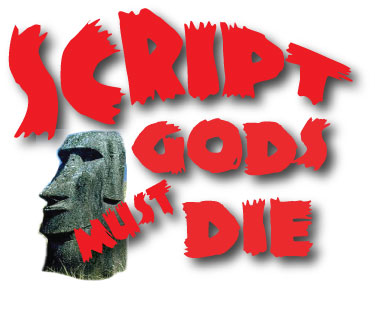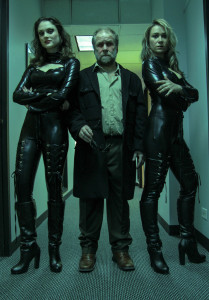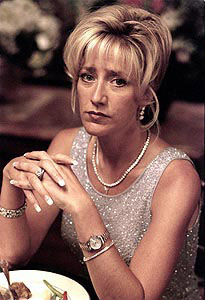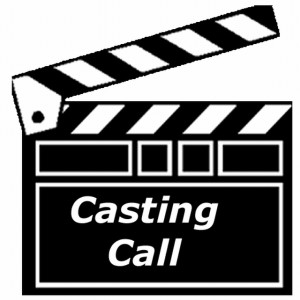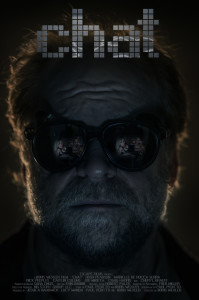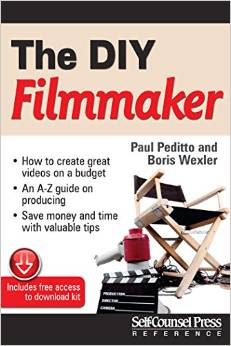If you’re the writer of a Studio or Indie flick, you likely won’t get within sniffing distance of final casting decisions. That’s reserved for money people and the director. Or if you’re a hyphen guy writer-director and your last name is Kaufmann, Tarantino, or Black.
The dynamic shifts with micro-budget. You’ll be in the room. That’s because in addition to being the writer, you’re likely: 1-The director 2-The producer 3-The director and producer. The audition process isn’t that big a deal, really. The only thing in the balance is the fate of your movie.
For Jane Doe as the dumbkopf, idiot-savant, craps-dealer director, I found myself giving smiley faces, half-smiley faces, or frowny faces to the actors after their auditions. Yes, seriously. I gave a smiley face to Edie Falco. Edie is now a three-time Golden Globe winner. I now work in the backroom of Chicago Filmmakers. ‘Nuf said.
Don’t give smiley faces, ok? Set up your room this way…
First, reserve a space where the actor performances won’t disturb anyone, and where you won’t be disturbed. Locally in Chicago, you can reserve a room with Park District. You should practice the Robert Rodriguez mantra of pay for nothing if humanly possible in trying to find space for auditions. I book rooms through Columbia College because I work there.
You’ll need a welcome area outside—table and chairs. On the table will be the “sides” (scenes for each actor). The actors will check in, be given sides and, hopefully, have been scheduled with enough time in between auditions (say 10-15 minutes) to look over the sides and prepare.
Inside the room, you should be prepared as well. You’ll need to record the auditions (I’ll discuss why shortly). You’ll have a single long table with the director, producers &/or writer. Actors will come in, be greeted by the director, drop off a resume, be asked if they have any questions by the director, and begin the audition. They’ll be asked to read, either with someone from the movie (reading a role from the table) or with another actor in the call backs. They’ll then be thanked and exit. And the next actor will be shown in. Rinse, lather, and repeat.
You may have noticed from the above that the audition is the director’s show. The director is in charge, both of the process of the audition and the results. Unless as a condition of his being hired the producers have control, it will be the director’s call who is ultimately cast. That said, if your director is Captain Bly in the audition room, there’s a good likelihood they’ll be a power tripper on set, and you might TAKE NOTE of that. Only a fool wouldn’t consult the other people in the room on who to call back or not. When the actor leaves the room it’s not uncommon for the director to look around the table and ask for brief thoughts on each actor. It will help determine who you call back.
Also helping is the camera you’re running. It’s a curious thing, but sometimes the strongest actor in the room, isn’t. Meaning: This is film. Well, digital. Actor’s performances have a tendency to look different in the camera than in person. Occasionally the person you thought was in the room comes off as stilted. The person you thought was stiff comes off as subtle and intriguing.
Tape your auditions. Consult your people. Work up a list for each role and the actors you want to call back. Make those calls and book the call backs. You’ll need a Casting Director to do all this tedious groundwork. And, if it’s micro-budget, guess what that role pays… Exactly what you paid the writer for five drafts and nine months of his life gone in writing the thing: $0.
The call backs are a different animal from the initial “generals”. These are narrowed-down, your best actor options. You’ll likely be pairing actors off (and will want to schedule for that). So, for Chat, if we’re bringing back to the Top 3 Falcons, we’ll want to match them off with the Top 3 Mary Roses. These characters have several scenes together and you’ll want to see the chemistry the actors have together. You also want to see how the actors take directions and do follow-up readings. It’s far more impressive for an actor with no preparation to take their reading in a whole different direction than just repeating their first “choice.”
Never forget, whoever you hire, you’ll be spending days, if not weeks with them on set. The audition process is an audition for the actor-director relationship as well. You don’t NOT want to be shackled to an arrogant, inflexible Diva for 18 days. Not on a micro-budget where everyone will be asked to go above and beyond in terms of energy and commitment. Look for the actor who will bring you these intangibles.
The great strength of our Chat director Boris Wexler (see Boris, I did say something nice about you!) is his pragmatism. He believes in an empirical approach. Yes, he trusts his gut, but he also wants to know what the people around him are thinking.
When it came time to make the final choice for one of the lead characters, Boris decided on Actor A. He asked me and the producers who watched the call-backs who they would choose. It was clean sweep, for Actor B. Boris cast Actor B. That is a very great strength and something you should endeavor to emulate in your own micro-budget experience.
Life Lesson 22Z: Trust your gut on casting, but keep an open mind.
